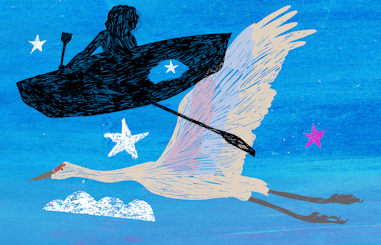
My family isn’t here to go to medical appointments with me or talk me through my symptoms or make strange jokes about body parts to ease the tension. They aren’t in another zip code or even across the globe. After every surgery in my adult life, there was no hastened, helpful, overprotective mom or tita to shuffle full plates to my face, coaxing me, you better eat, while tending to the bandages surrounding my feet, chest, or hips. I became disabled after they were already buried in graves. Now, my titas, lola, and mom are all in the afterlife, watching me bumble about as I worry about bleeding to death a few times a week. I picture them crowding around a projector to watch me, their favorite show, commiserating over my soiled clothing and crying fits in between Zoom calls: Watch the tomboy daughter and now man fumble with his drenched boxers in a public bathroom! Can he stop the soiling with a dishrag found in a dingy cupboard? Ohhh, let’s see how this goes.
When I learn I have cysts—bursting baby fireworks spitting out blood in vengeful directions—I can’t help but wonder how many times the women in my family were bleeding and told no one, not even one another? How many times did they curtly smile as they served their families dinner, or politely nod yes to their bosses, or make illustrative points in their barangay club without once mentioning the pouring between their legs? Was my mom bloodied the whole time she clinked the white snap of majong blocks as she sat with my titas, her sisters, a cigarette fading on her lip?
102F fever and the stomp of a rhinoceros tap dancing on my cranium, but my belly gets the most pounding, cramps can’t even describe this… I list my symptoms to the new OB/GYN and then later to the sonographer for the trans-vaginal ultrasound (which sounds to me more like a queer concert tour than a medical procedure). My patient file was by then a glorious graffiti of announcements: Transgender, Use He/Him pronouns, Please refer to my patient as Kay. But the eastern European woman holding the freshly lubricated probe didn’t say my name even once. She pointed to the stirrups, waiting for me to assume the position. Waiting for me to spread my legs open like a gash.
I watched the ceiling and counted by fives, 5, 10, 15, 20, how many times had I bled through my boxers? How many dollars have I spent on tampons alone? 25, 30, 35, the number of seconds I usually spent heaving over a toilet before the huge spurt of blood splattered my thighs, small alien globs raining down to the linoleum. I counted and felt the metal probe shift around inside, waiting to see my ovaries on the gray, vague screen. There were informational pamphlets with bold headlines stating matter-of-factly, Women’s Reproduction in a clear plastic case on the counter next to clipboards, all of them upright, certain, unfettered. Inside me, my ovaries were stationary blobs, revealing nothing, and I looked up to the ceiling again, willing the shapes to say something, to give me the answers I needed. Maybe to tell me the origin of all that blood, whether those crimson animals were really as angry as they seemed. But nothing, just two grey blobs, two eyes as vacant and bewildered as I felt.
Of course, my body has always been unruly. Nothing about my gender or my skin or the way I grew up was considered mainstream by any white, Western standard, and my body was no exception. In every classroom I entered, something about me was too much. Now, it seemed my body-mind was hell-bent on embodying its unruly mission, its refusal to behave as if to exclaim, You want blasphemy?! I will give you blasphemy! I picture its deep guttural shout, much like the one I’d heard from X-Men’s Storm, her muscular arms jolting to the heavens, fingertips fringed by bright lightning, her body elevated into a faultless skyline. What is more dangerous, more notorious, than a man who bleeds when he is not supposed to? What is more nefarious than someone who refuses to be a woman or a man, but a borderless teeming of plasma? I wonder, each time the bleeding and the pain finally stops, whether my ancestors remember the feeling of this relief in their own bodies, whether they applaud the sound of it in mine.
___
Kay Ulanday Barrett is a poet, essayist, and cultural strategist. They are a recipient of the 2022 Foundation for Contemporary Arts Cy Twombly Award for Poetry. They have attended residences at Tin House, Millay Arts, Baldwin For the Arts, and MacDowell. Their work has been published in The New York Times, Lit Hub, them., The Maine Review, and more. Their book More Than Organs (Sibling Rivalry Press, 2020) is a 2021 Stonewall Honor Book and a 2021 Lambda Literary Award Finalist.

2 comments
J says:
Jan 24, 2024
Beautiful
BJ says:
Jan 27, 2024
I want more! thank you for this 🙂